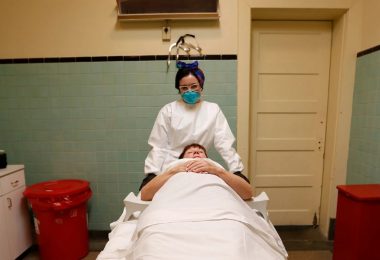
College professors typically begin their careers teaching part-time, sometimes at multiple schools, though some may be employed as tenure-track faculty soon after completing their doctorate. Income can vary depending on an instructor’s field, as well as the type and size of school at which he teaches. Professors who can get a tenure can earn considerably more than adjuncts.
Job Description
College professors create curriculum, teach courses, mentor students, and grade student work. They may also be involved in task forces and institutional committees. Besides, academics are expected to contribute to scholarship in their fields, which includes publishing academic papers and books and representing at conferences.
Though procedures differ by institution, assistant professors are at the entry-level of the tenure path. Associate professors generally have tenure, and full professors have the most senior tenured position. The lower rank of an instructor is not part of the tenure path and does not usually lead to a professorship. Promotion is based on achievements, such as publishing papers, obtaining research grants, and the number of years in the position. Professors who anticipate tenure at an institution and do not get it usually seek employment in other institutes.
Professor Tasks
- Take up research to expand knowledge by performing experiments, examining original documents, or analyzing and collecting data, other source material, and literature.
- Observe the latest innovations, developments, and trends in the academic sector.
- Supervise graduate students’ research and teaching.
- Publish research findings.
- Prepare exercises and laboratory experiments lectures; grade papers and exams; advise and work with students individually.
Educational Requirements
College professors are usually expected to earn a doctoral degree in their subject, barring a few exceptions. According to the U. S DOL (Department of Labor’s) BLS, some universities also prefer to employ instructors with vast non-academic work experience.
According to the CHE (Chronicle of Higher Education), the average salary of an assistant professor at a public 4-year college was $79,873 during the 2018 to 2019 school year. Assistant professors at private 4-year schools earned, on average, $77,600 at the same time.
Industry
College instructors generally teach in university classrooms, though many currently also teach online classes, from their home. Fresh college instructors who are not on a tenure-track can work as adjunct professors at multiple schools, which can add to commute times. Tenure-track professors work full-time hours.
Highest Paying Subject Areas
Although the DOL (Department of Labor) set the median wage for all professors at $79,540 in 2019, the median pay varied widely according to subject wise. Law professors had the top median annual pay of $113,530, followed by economics and engineering professors at around &104,370 and &101,010, respectively. Criminal justice and law enforcement professors were among the lowest earners with a median wage of about 62,860. The compensation for professors in a given subject area often reflects the relative value of professionals in that area.
Schools With Highest Paid Professors
Location is another crucial factor when it comes to college professors’ salaries. Working at a university or prestigious college comes with higher remuneration. A 2019-20 survey by the AAUP (American Association of University Professors) ranked Columbia University first for top paid professors, with an average annual salary of $251,500. Stanford University placed second with average salaries of $246,300. The average Harvard professor compensation of $245,900 ranked third.
How Much Do College Professors Make
Careers in the U.S:
Entry-level professors who gradually gain tenure and progress in their careers can expect to make more as they gain work experience. A study by PayScale.com(1) showed the following correlation between salary and years of experience:
0-5 years: $60,547
5-10 years: $71,000
10-20 years: $86,535
20+ years: $99,734
Careers in Europe:
An early career Professor, Postsecondary / Higher Education with 1-5 years of experience, makes an average total remuneration (includes bonus, tips, and overtime pay) of £61,319. A mid-career Professor, Postsecondary / Higher Education with 5-10 years of experience, makes an average total compensation of £64,976. An experienced Professor, Postsecondary / Higher Education with 10-20 years of experience earns an average total salary of £66,667. In their late-career (20-plus years), employees make an average total compensation of £70,569.
Careers in Asia:
An experienced Professor and Associate Dean with 10-20 years of experience make an average total compensation (includes bonus, tips, and overtime pay) of S$220,000. In their late-career (20-plus years), employees make an average total remuneration of S$300,000.
Job Growth Outlook
According to the U.S. BLS, positions for all post-secondary teachers are expected to grow by fifteen percent from 2016 to 2026. This rapid job growth is the result of an increasing need for workers to earn higher education degrees. The best opportunities for post-secondary educators will be for those specializing in health or nursing careers, and aspiring professors should be aware that tenure-track, full-time positions may be scanty.
The growing demand for more professors is based on an estimated increase in the number of college students. The DOL (Department of Labor) predicts that many universities and colleges will focus on hiring part-time professors to save money. With fewer tenure-level positions becoming available, competition is expected to be fierce for the top-paying positions.
Recommended Articles:




